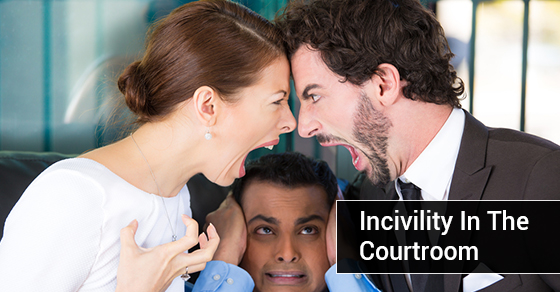Incivility in the Courtroom: How Far is Too Far?

How far can a lawyer go in defending his client?
What started out for Joseph Peter Paul Groia as a criminal law case in provincial court, in which he was defending his client against charges of insider trading, turned into a trial of his own alleged misconduct, and went all the way to the Supreme Court of Canada.
The Felderhof case, in which Groia was the defence attorney, was characterized by its hostility due to the interactions between Groia and the Ontario Securities Commission prosecutors. Groia engaged in personal attacks, sarcastic outbursts, and allegations of professional impropriety against the government. Groia’s disagreement was rooted in his honest but mistaken understanding of the law of evidence and the role of the prosecutor. Initially, the trial judge used a hands-off approach but due to the escalation of adverse behavior by Groia, the trial judge directed Groia to stop repeating the misconduct allegations against the prosecutors.
Once the Felderhof case had concluded, the Law Society brought a disciplinary proceeding against Groia alleging professional misconduct based on uncivil behavior during the course of the trial. Initially a 3-member Law Society Hearing Panel found Groia guilty of professional misconduct, suspended his license to practice for 2 months and ordered him to $247,000 in costs. On appeal, the Law Society concluded that Groia was guilty of professional misconduct but reduced his suspension to 1 month and decreased the cost award to $200,000. The standard applied to misconduct findings and sanctions by the Law Society is the “reasonableness” standard. The Law Society’s Appeal Panel’s approach to determining when incivility amounts to professional misconduct and its application of that approach in assessing a lawyer’s conduct involves an interpretation of the Rules of Professional Conduct and the discretionary application of general principles to the relevant facts at bar.
The Appeal Panel developed a multi-factorial approach to determine whether a lawyer’s in-court behavior crosses the line into professional misconduct on the basis of incivility. Firstly, the Appeal Panel recognized the importance of civility in the legal profession and the analogous need to target behavior that affects the administration of justice and the fairness of a proceeding while remaining sensitive to the lawyer’s duty to resolute advocacy. Resolute advocacy is particularly important in criminal law due to the client’s constitutional right to make a full defence. The Appeal Panel also recognized the importance of a flexible and precise approach when determining whether a lawyer’s behavior permits a finding of professional misconduct. Contextual factors that are considered include what the lawyer said, the manner and frequency in which it was said, and the judge’s reaction to the lawyer’s behavior.
When assessing whether Groia’s misconduct allegations against the prosecution crossed the line into professional misconduct, the Court considered whether it was made in good faith with a reasonable basis. The good faith portion questions what the lawyer actually believed when making the allegation, and the “reasonable basis” portion requires the Law Society to look beyond what the lawyer believed and examine the foundation underpinning the allegation. When the impugned behavior occurs in a courtroom, the judges reaction to the lawyer’s behavior and the lawyer’s modification of the behavior is taken into account.
The Appeal Panel’s approach allows the Law Society’s disciplinary tribunal to balance a lawyer’s expressive freedom with their statutory mandate in any given case. Considering the context of each scenario enables the Law Society to gauge the value of the impugned behavior which allows for a balanced decision to be made. The Groia decision stated this was the appropriate approach for dealing with professional misconduct by the Law Society.
The previous finding that Groia displayed professional misconduct based on incivility was deemed unreasonable by the Supreme Court of Canada. The decision rested on the fact that the question of incivility is not whether Groia was right or wrong but whether, based on his understanding of the law, his allegations of prosecutorial misconduct which the Appeal Panel found were made in good faith, had a factual foundation. Groia’s allegations were thus reasonably based. Other contextual factors could not support a finding of professional misconduct Groia as his behavior changed in response to the judge’s directions. The Appeal Panel failed to account for these contextual factors in the analysis which led to the faulty finding. The complaints were dismissed.
Hailed as a victory for free speech and fearless advocacy, the Court’s decision nevertheless recognized that there are limits to the ability of a lawyer to attack the other side. And as many commentators in the legal community have noted, personal attacks against your opponent often undermine the merits of your client’s case, and are simply an example of poor advocacy.

